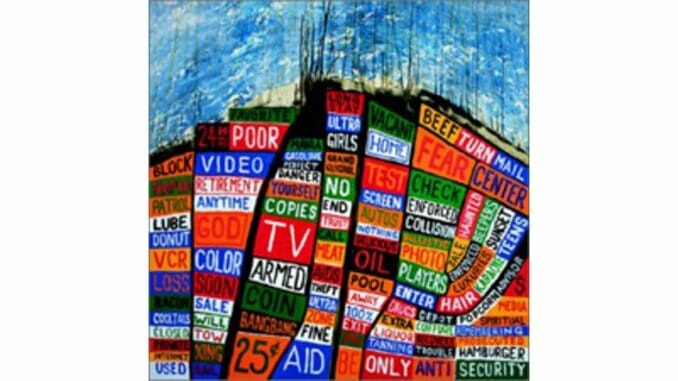
These are the days for which Radiohead has been waiting. While languorous paranoia and inescapable alienation have hallmarked their work since OK Computer blasted them into commercial and artistic superstardom, they’ve used their music to simultaneously imagine and prepare for a world of holocausts and technological nightmares. As such, they’ve packaged the last two installments of their plan to save themselves and their listeners (2000’s Kid A and 2001’s Amnesiac) in intentionally obscure wrappings, separating out the true believers via esoteric electronica elements and an unflinchingly postmodern mindset. With war, terror and governmental conspiracy converging in increasingly confusing and complicated ways, the real and imagined bogeymen haunting their songs feel even more corporeal. The band has reached a decisive point in their progression with Hail to the Thief.
Neither a return to the genre-breaking guitar rock that launched a thousand imitators nor an abrasive collection of unyielding electronic theory benders, Radiohead’s sixth album finds the band reaching a compromise between the two competing theoretical strands that compose their sound. Guitars turn up on most of the 14 tracks, yet rarely deliver the caustically catchy growl of their most accessible work. Jonny Greenwood’s guitar work sounds even more truncated and strangled, whether ominously unwinding over the frantically driving “2+2=5” or laying ethereally beautiful melodies in “Scatterbrain.” Some of the experimental extravagance has been trimmed away, leaving the hooks surprisingly close to the surface, but the reliance on progressive technology maintains its presence. If anything, the electronic and organic elements are more subtle and seamless, blurring into an elusive statement that weaves its way through the hour-plus set.
Piano skitters over looped processed beats in the mid-tempo “A Punchup At a Wedding,” just as twinkling xylophone twists around the hazy electronic popping that taps out the intro of “Sit Down. Stand Up.” As always, Thom Yorke’s pure, powerful voice, distorted and multi-tracked into a wraithlike choir, is the ghost in the machine communicating a world of resigned humanity in its every crack and moan. That voice carries most of the melodic material, too, climbing up and down so unpredictably within his register that only numerous listens can effectively trace each song’s trajectory. Yet for every dark slice of theatricality such as “There There” or the straightforwardly funereal “We Suck Young Blood,” balance is added by the sparking beats and indistinct thud of “The Gloaming” or the synthetic whir of “Where I End and You Begin.” Where the previous two albums occasionally gave the impression of being willfully difficult, on Thief the band tangibly works within the realm of human drama.
Radiohead slipped these songs into their set lists long before finally recording them, and as such, the tracks take on a lived-in feel, lacking the icy stillness underlying the previous two releases’ experimentation. To that extent, Hail to the Thief is undoubtedly the most groove-oriented record they’ve ever made. With a song-a-day studio schedule, the tracks resonate with increased immediacy. The melodies are no less elusive, unfettered from the rhythms around which they flutter.
But Thief isn’t an overtly political album—Yorke’s brilliance has never relied on sloganeering or simplistic directives to communicate his paranoia and distrust of just about everything. Rather, he continues to exert mastery over the subtleties and nuances of language. His protagonist remains the frail, hopeless survivor, facing off against an insurmountable enemy, offering covert warnings and coded stabs against apathy while awaiting his imminent destruction. His antagonist remains the faceless agent of power that reassures the innocent of their safety all while threatening swift annihilation. Yorke can say nearly anything and make its meaning both frighteningly self-evident and indirectly profound.
Radiohead has earned the right to return to the rock format that catapulted them to the position of the genre’ most revered saviors. That they haven’t cashed in on the hopes of the willing is much to their credit. Still, as much as their music has evolved both stylistically and thematically, the essence of their aesthetic has largely remained the same since OK Computer, bringing their doomed utopia to the edge of self-parody. Even at this point, though, Radiohead’s paranoia is thoroughly convincing, and their brand of mordant isolation has rarely felt so urgent. If this is the sound of compromise, few artists have ever been so successful in pushing themselves forward, while simultaneously peeling back from the edge of innovation.